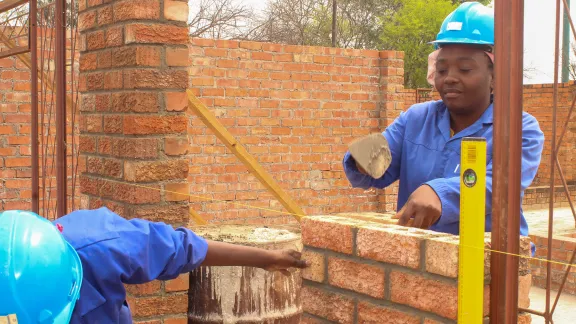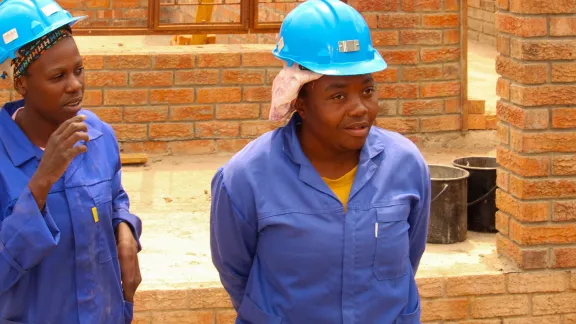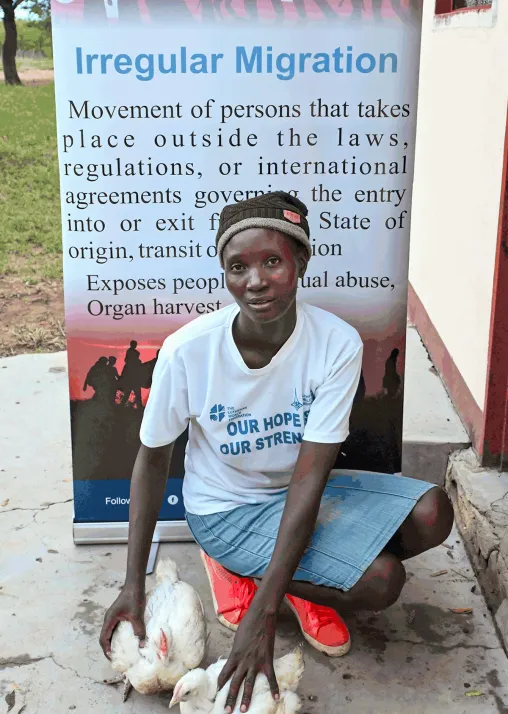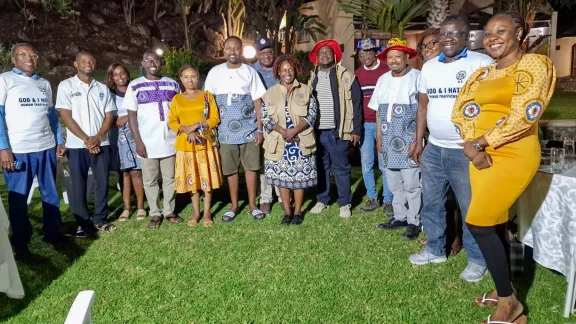In two border districts in Zimbabwe, the Lutheran church Symbols of Hope program is raising awareness about the dangers of human trafficking and creating job opportunities at home.

Nomathemba Sibanda displays her masonry skills at the public works site in Filabusi town, southern Zimbabwe. Photo: LWF/Monmo Dahiru Moodi
Lutheran church empowers returnee migrants
(LWI)- Nomathemba Sibanda dreamed of a better life for herself and her daughter when she left Zimbabwe for South Africa without proper papers. She paid a smuggler 1,500 rands (EUR 75) in 2009 to cross the border with a group of other undocumented migrants. But she soon realized that the opportunities she hoped for were not there. She worked as a low-paid laborer on a horse-riding field in Johannesburg, barely making enough to survive. She decided to return to her home country in 2019.
Today, she is among 13,000 mostly young women and men supported by the Symbols of Hope (SoH) program, run by the Evangelical Lutheran Church in Zimbabwe (ELCZ) and its development arm, Lutheran Development Services (LDS). The Lutheran World Federation (LWF) supports SoH activities in Zimbabwe, Ethiopia and Nigeria, with the objective of stopping irregular migration and human trafficking and finding alternative ways of improving the lives of potential and returnee migrants.
In Zimbabwe, SoH concentrates its work in the southern districts of Insiza and Chiredzi, near the borders with Mozambique, Botswana and South Africa, which are key destinations for Zimbabweans seeking work opportunities and a better life. With a focus on potential and returning migrants, its activities include awareness raising in communities, training in vocational and entrepreneurial skills, providing start-up kits for small businesses, and equipping designated public facilities with recreational equipment for outdoor sports such as football and netball.
Sibanda enrolled for a course in her “childhood dream” career – masonry – and she is currently working at the local government construction site in Filabusi town, where she had previously worked as a trainee. She recently shared her story with a visiting SoH global team comprising LWF and country program staff from the three countries, and from the Evangelical Lutheran Church in America AMMPARO initiative for accompanying children migrants. “I am convinced that what inspired public works to call me back was the devotion that I demonstrated during my work-related learning with them, as you can see in the structure,” she said, demonstrating her wall casting skills.

Nomathemba Sibanda (right) flanked by her assistant, shares her story with the visiting SOH team on an exchange visit to Zimbabwe. Photo: LWF/Monmo Dahiru Moodi
One of the goals of the SoH program is to ensure that those choosing to stay or migrate are better informed and equipped to market their professions and skills, said Ashenafi Haile, LWF Program Executive for Diakonia and Development. During the 25 September-1 October 2023 exchange visit, “we learned that when we use the existing community structures including village chiefs, church congregations, government agencies and other partners, we can reach many beneficiaries,” he noted. Sibanda’s story, he said, is one of the many examples of how the program changes lives for the better.
Skills and influence
Mildred Nkala shared her story. May 2022 was an important month in her life. It was “the first time ever” that she had managed to pay her “children’s school fees in full and on time since they joined primary school in 2016.” Her SoH-supported poultry rearing project that started with 50 broiler chicks generated a profit of USD 280 in six and a half weeks, an achievement she would not have envisioned a year earlier.
A talented dress maker too, Nkala is expanding her business. Her “vision is to buy a sewing machine and start making clothes,” she says, donning a T-shirt with the SoH slogan, “Symbols of Hope - Our hope is our strength.”

Mildred Nkala, a talented dress maker, runs her own poultry business, with support from Symbols of Hope Zimbabwe. Photo: SoH/LDS
She hopes her poultry-rearing skills, and sharing her real-life testimony at SoH Zimbabwe community activities can dissuade other young people from taking on a journey that is fraught with many dangers including sexual exploitation and abuse “[In South Africa] I sometimes failed to even feed myself, because the jobs are hard to get, hence, I decided to return home,” Nkala recalls.

The Symbols of Hope global team comprising LWF and country program staff, during the visit to Zimbabwe. Photo: LWF/Monmo Dahiru Moodi
“No” to human trafficking
Communities in Insiza and Chiredzi largely depend on small-scale farming and other agricultural activities, which have become more vulnerable to recurrent droughts and dry spells, frequent crop failure due to pest outbreaks, and loss of livestock to animal diseases. Many young people migrate to South Africa and other countries due to climatic and economic challenges. The SoH program educates, raises awareness, and provides recreational activities to potential and returning migrants.
“No to human trafficking” are some of the messages in English and local languages that SoH disseminates on flyers, posters and banners in public places. In addition, ELCZ congregations continue to serve as meeting points for workshops and training of pastors who offer psychosocial support. Since 2021, over 40 pastors and other personnel from ELCZ and other churches have participated in activities to strengthen the local implementation of SoH’s work.
We hope that churches can help people change their attitudes and behaviors about the importance of having legal documents and following the right procedures and rules when they travel
Ashenafi Haile, LWF Program Executive for Diakonia and Development
Through SoH, “we hope that churches can help people change their attitudes and behaviors about the importance of having legal documents and following the right procedures and rules when they travel,” said Haile. He noted, however, that more work is needed to support returnees who have suffered trauma and require counseling and care. There is also need for stronger partnerships with other groups such as the International Organization for Migration, government law enforcement agencies, and other civil society organizations that share a similar vision.
Started in July 2017, the LWF Symbols of Hope program is implemented in collaboration with the Ethiopian Evangelical Church Mekane Yesus, Lutheran Church of Christ in Nigeria and Evangelical Lutheran Church in Zimbabwe The churches raise awareness among potential migrants, and share accurate information about irregular migration and the risks involved. They also provide psychosocial support to returnees including victims of human trafficking, offer vocational training and livelihoods’ support for sustainable income sources.


